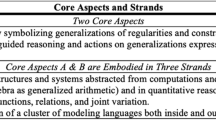Abstract
In recent decades, there has been considerable research that explores the teaching and learning of combinatorics. Such work has highlighted the fact that understanding and justifying combinatorial formulas can be challenging for students, and there is a need to identify ways to support students’ combinatorial reasoning. In this paper, we contribute to research that explores effective ways to foster students’ combinatorial reasoning by highlighting the role that shifts in representational registers can play in supporting students’ combinatorial reasoning and activity. In particular, we present a case in which two students, aged 12 and 14, reasoned about, and developed a formula for, binomial coefficients. This occurred in a teaching experiment designed to examine their generalizing activity. In these interviews, the students first solved problems about determining the volume of a cube and then shifted to a combinatorial interpretation of this task, leveraging binomial coefficients as a way to consider growth in higher dimensions. The students demonstrated sophisticated reasoning about combinatorial tasks and were ultimately able to generate and understand a formula for binomial coefficients. In framing this case, we focus on the students’ use of different representations, highlighting the power of being able to transition between representational registers as a way of supporting students’ combinatorial reasoning. In this way, our case demonstrates the value of representational registers specifically as a mechanism by which to potentially improve the teaching and learning of combinatorics.














Similar content being viewed by others
Notes
We note the similarity between their guess and the expression for the 3-dimensional case, which was 3N2 + 3 N + 1.
We note that because of how the students wrote 1s, they sometimes referred to the 1s as Is.
References
Batanero, C., Navarro-Pelayo, V., & Godino, J. (1997). Effect of the implicit combinatorial model on combinatorial reasoning in secondary school pupils. Educational Studies in Mathematics, 32, 181–199.
Carlson, M. P., Jacobs, S., Coe, E., Larsen, S., & Hsu, E. (2002). Applying covariational reasoning while modeling dynamic events: A framework and a study. Journal for Research in Mathematics Education, 33(5), 352–378.
Carpenter, T. P., Franke, M. L., Jacobs, V. R., Fennema, E., & Empson, S. B. (1998). A longitudinal study of invention and understanding in children’s multidigit addition and subtraction. Journal for Research in Mathematics Education, 29(1), 3–20.
Duval, R. (2006). A cognitive analysis of problems of comprehension in a learning of mathematics. Educational Studies in Mathematics, 61, 103–131.
Eizenberg, M. M., & Zaslavsky, O. (2004). Students’ verification strategies for combinatorial problems. Mathematical Thinking and Learning, 6(1), 15–36.
Ellis, A., Lockwood, E., & Celik, A. (2022). Empirical re-conceptualization: bridging from empirical generalizations to insight and understanding. Journal of Mathematical Behavior. https://doi.org/10.1016/j.jmathb.2021.100928.
Ellis, A. B., Lockwood, E., Tillema, E., & Moore, K. (2021). Generalization across multiple mathematical domains: relating, forming, and extending. Cognition and Instruction. https://doi.org/10.1080/07370008.2021.2000989.
English, L. D. (1991). Young children’s combinatorics strategies. Educational Studies in Mathematics, 22, 451–547.
Fischbein, E., Pampu, I., & Manzat, I. (1970). Effects of age and instruction on combinatory ability in children. British Journal of Educational Psychology, 40, 261–270.
Goldin, G. A. (2014). Mathematical representations. In S. Lerman (Ed.), Encyclopedia of mathematics education. Springer.
Harel, G. (2008). A DNR perspective on mathematics curriculum and instruction. Part II: With reference to teacher’s knowledge base. ZDM Mathematics Education, 40, 893–907.
Kramer, S. L., & Keller, R. (2008). A brief report: An existence proof: Successful joint implementation of the IMP curriculum and a 4× 4 block schedule at a suburban US high school. Journal for Research in Mathematics Education, 39(1), 2–8.
Lockwood, E., & Caughman, J. S. (2016). Set partitions and the multiplication principle. Problems, Resources, and Issues in Mathematics Undergraduate Studies, 26(2), 143–157.
Lockwood, E., & De Chenne, A. (2020). Using conditional statements in Python to reason about sets of outcomes in combinatorial problems. International Journal of Research in Undergraduate Mathematics Education, 6, 303–346. https://doi.org/10.1007/s40753-019-00108-2
Lockwood, E., Wasserman, N. H., & McGuffey, W. (2018). Classifying combinations: Do students distinguish between different categories of combination problems? International Journal of Research in Undergraduate Mathematics Education, 4(2), 305–322. https://doi.org/10.1007/s40753-018-0073-x
Maher, C. A., Powell, A. B., & Uptegrove, E. B. (Eds.). (2011). Combinatorics and reasoning: representing, justifying, and building isomorphisms. Springer.
Piaget, J., & Inhelder, B. (1975). The origin of the idea of chance in children. W. W. Norton & Company Inc.
Reed, Z., & Lockwood, E. (2021). Leveraging a categorization activity to facilitate productive generalizing activity and combinatorial reasoning. Online First Cognition and Instruction. https://doi.org/10.1080/07370008.2021.1887192
Steffe, L., & Thompson, P. (2000). Teaching experiment methodology: Underlying principles and essential elements. In A. Kelly & R. Lesh (Eds.), Handbook of research design in mathematics and science education. Lawrence Erlbaum Associates.
Tillema, E. S. (2013). A power meaning of multiplication: Three eighth graders’ solutions of Cartesian product problems. Journal of Mathematical Behavior, 32(3), 331–352. https://doi.org/10.1016/j.jmathb.2013.03.006
Acknowledgements
This research was supported by the National Science Foundation (DRL-1419973).
Author information
Authors and Affiliations
Corresponding author
Additional information
Publisher's Note
Springer Nature remains neutral with regard to jurisdictional claims in published maps and institutional affiliations.
Rights and permissions
About this article
Cite this article
Lockwood, E., Ellis, A.B. Two students’ mathematical thinking and activity across representational registers in a combinatorial setting. ZDM Mathematics Education 54, 829–845 (2022). https://doi.org/10.1007/s11858-022-01352-8
Accepted:
Published:
Issue Date:
DOI: https://doi.org/10.1007/s11858-022-01352-8



